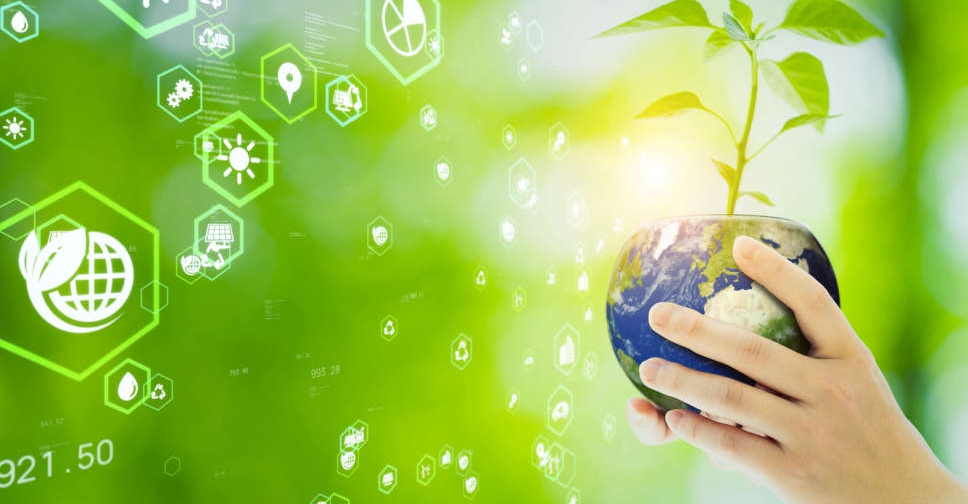
Saudi Arabia's crown prince said on Saturday that the world's top oil exporter aims to reach zero-net emissions by 2060 and more than double its annual target to reduce carbon emissions.
Crown Prince Mohammed bin Salman and his energy minister said OPEC member Saudi Arabia would tackle climate change while ensuring oil market stability, stressing the continued importance of hydrocarbons.
They were speaking at the Saudi Green Initiative (SGI), which comes ahead of COP26, the UN climate change conference in Glasgow at the end of the month, which hopes to agree deeper emissions cuts to tackle global warming.
China and India, the top emitters of greenhouse gases after the United States, have also resisted committing to a 2050 timeline to achieve net-zero, a target that U.S. President Joe Biden's administration has adopted.
"The Kingdom of Saudi Arabia aims to reach zero-net emissions by 2060 under its circular carbon economy programme ... while maintaining the kingdom's leading role in strengthening security and stability of global oil markets," Prince Mohammed said in recorded remarks.
He said the kingdom would join a global initiative on slashing emissions of methane by 30 per cent from 2020 levels by 2030, which both the United States and the EU have been pressing.
U.S. climate envoy John Kerry is due to attend a wider Middle East green summit Riyadh is hosting on Monday.
Energy minister Prince Abdulaziz bin Salman said Riyadh, a signatory to the Paris climate pact, had submitted its nationally determined contributions (NDCs) - goals for individual states under efforts to prevent average global temperatures from rising beyond 1.5 degrees Celsius above pre-industrial levels.
The SGI, which the crown prince said would see investments of over $186.6 billion (AED 685 billion), aims to eliminate 278 million tonnes of carbon emissions per year, up from a previous target of 130 million tonnes.
Saudi Arabia pledged to reduce carbon emissions by more than four per cent of global contributions in March. It said that would involve generating 50 per cent of its energy needs from renewables by 2030 and planting billions of trees in the desert state.
HYDROCARBONS STILL NEEDED
Saudi Arabia's economy remains heavily reliant on oil income as economic diversification lags ambitions set out by the crown prince.
Saudi officials have argued the world will continue to need Saudi crude for decades.
"The world cannot operate without hydrocarbon, fossil fuels, renewables, none of these will be the saver, it has to be a comprehensive solution," the energy minister said.
"We need to be inclusive, and inclusivity requires being open to accept others efforts as long as they are going to reduce emissions," he said, adding that the kingdom's young generation "will not wait for us to change their future".
He said net-zero might be achieved before 2060, but the kingdom needed time to do things "properly".
Fellow Gulf OPEC producer the United Arab Emirates this month announced a plan for net-zero emissions by 2050.
The chief executive of UAE oil firm ADNOC, Sultan al-Jaber, stressed the importance of investment in hydrocarbons, saying the world had "sleepwalked" into a supply crunch and that climate action should not be an economic burden on developing nations.
GREEN PUSH
Climate Action Tracker gives Saudi Arabia the lowest possible ranking of "critically insufficient".
Experts say it is too early to assess the impact of Saudi's nascent solar and wind projects. Its first renewable energy plant opened in April, and its first wind farm began generating power in August.
Saudi megaprojects also incorporate green energy plans, including a $5 billion (AED 18 billion) hydrogen plant, and state-linked entities are pivoting to green fundraising.
Some investors have expressed concerns over the kingdom's carbon footprint, while others say it emits the least carbon per barrel of oil.
"Obviously the carbon footprint is an issue. However, we would highlight that realistically, carbon is going to be slow to phase out, and oil is here for some time yet," said Tim Ash at BlueBay Asset Management.


 Nasdaq set to confirm bear market as Trump tariffs trigger recession fears
Nasdaq set to confirm bear market as Trump tariffs trigger recession fears
 Dana Gas and Crescent Petroleum exceed 500M boe in Khor Mor field
Dana Gas and Crescent Petroleum exceed 500M boe in Khor Mor field
 China to impose tariffs of 34% on all US goods
China to impose tariffs of 34% on all US goods
 Shares bruised, dollar crumbles as Trump tariffs stir recession fears
Shares bruised, dollar crumbles as Trump tariffs stir recession fears
 Wall Street futures sink as tariffs fuel recession fears
Wall Street futures sink as tariffs fuel recession fears




